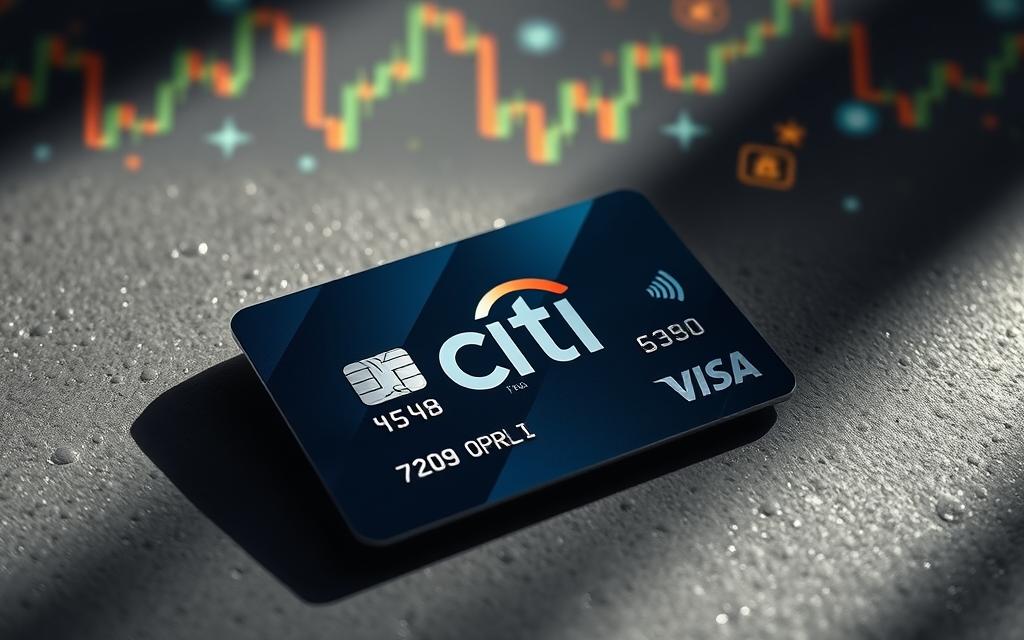Table of Contents
Many financial institutions treat cryptocurrency purchases as cash advances. This classification often applies to transactions made on exchanges like Coinbase or Binance. High fees and immediate interest charges may apply, making it crucial to review your cardholder agreement.
Citi has adjusted its policies over time regarding digital asset purchases. Some users report success, while others face restrictions. Always check for foreign transaction fees if dealing with international platforms.
Understanding the risks is essential. Unlike standard purchases, cash advances start accruing interest immediately. Additionally, daily limits might affect larger transactions. A crypto credit card could offer alternatives, but terms vary widely.
Before proceeding, confirm Citi’s current stance and weigh the costs. Hidden charges can quickly add up, turning a simple purchase into an expensive decision.
Introduction
The rise of digital assets has transformed how people approach investments. Over $1 trillion flows through the crypto market annually, with traders leveraging credit cards for quick access. Major banks like Citi now navigate this demand while balancing risks.
As a top-tier issuer, Citi’s stance on digital currencies reflects broader industry caution. Policies vary by region, but fees and security remain universal concerns. For deeper insights, explore Citi’s cryptocurrency policies.
Global shifts, like BRICS nations exploring unified currencies, add complexity. Volatility makes cryptocurrency a high-stakes choice for credit-based purchases. Specialized options, such as Gemini’s card or Fidelity’s rewards programs, offer alternatives.
This guide clarifies costs, limits, and safer strategies. Whether you’re a first-time buyer or seasoned trader, understanding these nuances is key.
Will Citi Let You Buy Crypto with a Credit Card?
Financial institutions have tightened policies on digital asset purchases in recent years. Citi now treats these transactions as cash advances, imposing a 5% fee or $10 minimum per transaction. This shift, implemented after 2020 restrictions, aligns with broader industry caution.
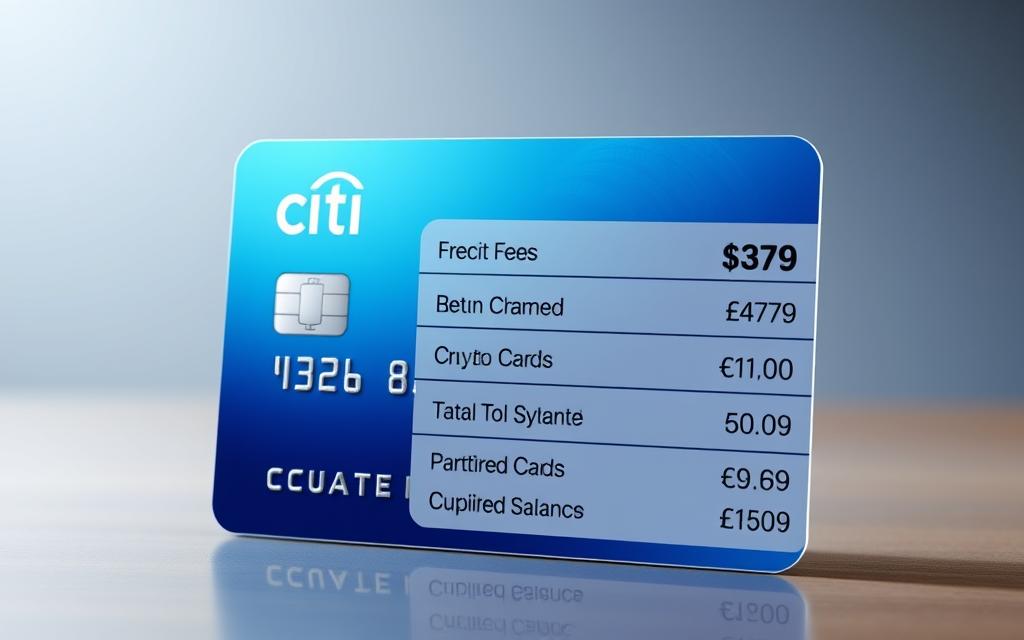
The cash advance classification carries significant costs. Interest accrues immediately at APRs exceeding 25%, with no grace period. Daily limits may also cap larger crypto credit purchases, varying by account tier.
Compared to competitors like Chase and Capital One, Citi’s approach is stricter. While some credit card issuers block crypto outright, Citi permits it but with heavy fees. Approved platforms include:
- Kraken
- Binance
- Coinbase
Foreign transactions may add up to 3% in extra charges. Notably, fraud protection rarely covers disputed purchases involving digital assets. Always verify current terms before proceeding.
How to Buy Crypto with a Citi Credit Card
Purchasing digital assets using a credit card involves several steps. Each stage requires attention to fees, security, and platform rules. Below is a streamlined guide to navigate the process.
Step 1: Choose a Cryptocurrency Exchange
Compare top exchanges like Coinbase (2.49% fee), Binance (2%), and Kraken (1.5%). Fees impact your final conversion rates, so prioritize cost-efficient platforms.
Most exchanges require:
- ID verification (passport or driver’s license)
- Proof of address
- Two-factor authentication setup
Step 2: Link Your Citi Credit Card
Navigate to the payment section and select “Add Card.” Citi may trigger a 3D Secure authentication pop-up for fraud checks. Avoid using a debit card unless prepared for instant funds withdrawal.
Step 3: Complete the Purchase
Enter the desired amount and confirm the transaction. Note:
- Some platforms impose holding periods (e.g., 3–5 days)
- Transfer assets to cold storage (Ledger/Trezor) post-purchase
Always review USD-to-crypto rates before finalizing your buy crypto credit decision.
Fees Associated with Citi Crypto Purchases
Fees can quickly escalate when purchasing digital currencies through traditional banking channels. Unlike standard purchases, these transactions often trigger multiple charges. Reviewing the fine print helps avoid unexpected costs.
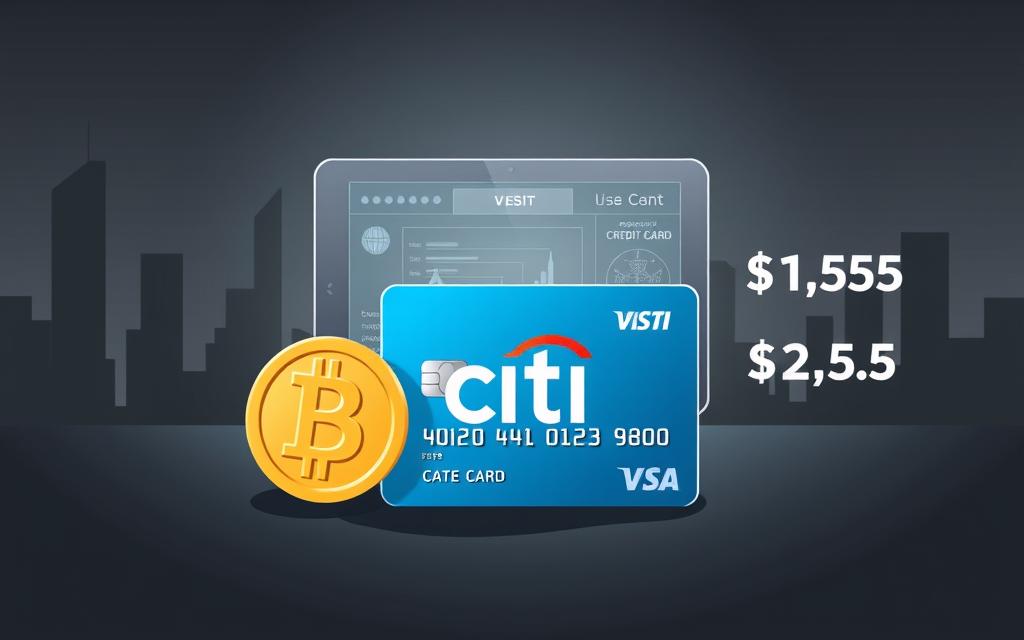
Cash Advance Fees
Citi classifies crypto buys as cash advance fees, imposing a 5% charge ($10 minimum). This fee applies instantly, reducing your available credit. For example, a $1,000 purchase incurs a $50 fee before market fluctuations.
Higher Interest Rates
The interest rates for cash advances soar to 29.99% APR, with no grace period. Interest starts accruing daily, compounding costs. If unpaid monthly, a $1,000 balance grows by $29.99—before the original fee.
Foreign Transaction Fees
International transactions add a 3% surcharge. This applies to exchanges based outside the U.S., like Binance or Bitfinex. Combined with the cash advance fees, total costs can exceed 8%.
| Fee Type | Cost | Example ($1,000 Purchase) |
|---|---|---|
| Cash Advance | 5% ($10 min) | $50 |
| Interest (First Month) | 29.99% APR | $29.99 |
| Foreign Transaction | 3% | $30 |
| Total Potential Cost | $109.99 |
Note: Exchange-specific processing fees may apply separately. Always verify current rates via Citi’s customer service at 1-800-950-5114.
Pros and Cons of Using a Citi Credit Card for Crypto
Speed versus cost defines the crypto credit card dilemma. While plastic offers instant access to digital assets, fees and risks demand careful evaluation. Below, we break down the trade-offs.
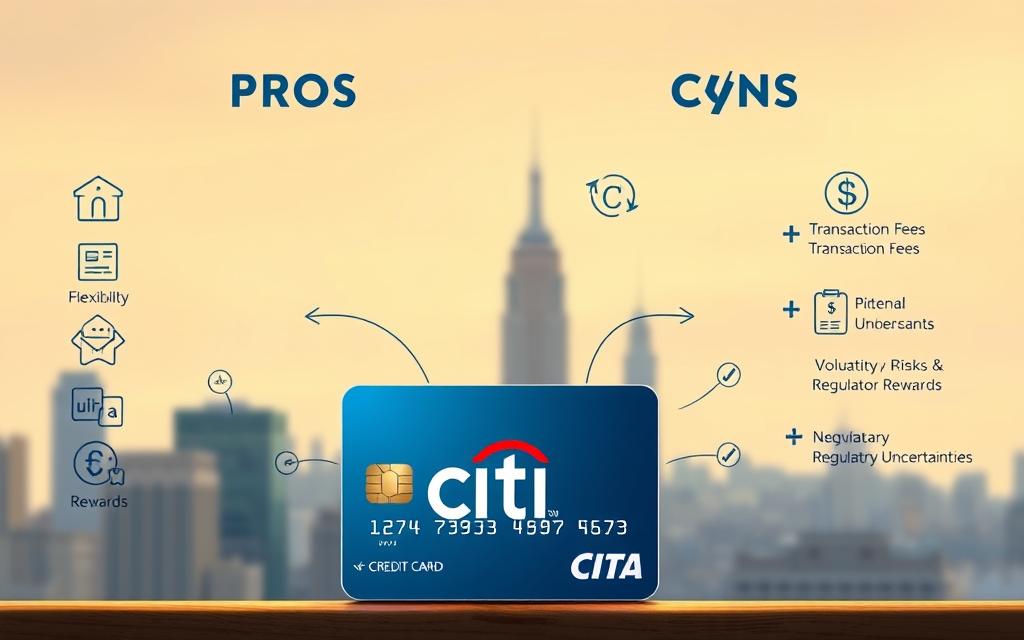
Advantages: Convenience and Speed
Credit cards enable same-day crypto purchases, crucial for time-sensitive trades. Bank transfers take 3–5 days, potentially missing market dips or surges.
Key benefits include:
- Immediate portfolio diversification
- No waiting for ACH clearance
- Reward points on eligible transactions
Disadvantages: High Costs and Risks
NerdWallet’s 2023 study reveals 72% of users overspend limits when using credit cards for crypto. Additional pitfalls:
- Cash advance interest rates (up to 29.99% APR)
- No chargeback rights on most exchanges
- Margin calls if asset values plummet
“Crypto credit card debt surged 40% in Q1 2023, with average balances exceeding $5,000.”
| Feature | Credit Card | Debit Card |
|---|---|---|
| Purchase Protection | Limited | Full |
| Interest Charges | Immediate | None |
| Daily Limits | $1,000–$5,000 | Bank-dependent |
| Foreign Fees | 3% | 0–1% |
User testimonials highlight fee shock, with some reporting $150+ in unexpected charges on a $2,000 crypto purchase. Always cross-check current rates and policies.
Citi Credit Card Rewards and Crypto
Reward programs often exclude cryptocurrency transactions from earning points. Citi’s ThankYou Points system treats these as cash advances, disqualifying them from standard credit card rewards. This policy aligns with industry trends, where digital asset purchases rarely qualify for perks.
Workarounds exist for savvy users. Redeeming points for gift cards or travel, then converting funds, avoids direct cash advance fees. However, third-party platforms may charge conversion fees up to 5%, eroding value.
Specialized cards like the Gemini Credit Card® offer 4% back in crypto credit on gas purchases. Venmo’s card provides 3% in select categories. Both bypass traditional reward exclusions but require careful tax planning.
Fidelity allows indirect exposure by linking brokerage accounts to crypto platforms. Users can redeem card rewards as cash, then invest. Break-even points vary:
- Gemini: 1% fee after $500 monthly spend
- Venmo: 2% foreign transaction fees apply
- Fidelity: No fees for ETF conversions
“IRS treats crypto rewards as taxable income at fair market value upon receipt.”
Before using credit card rewards to buy crypto, consult a tax professional. Mismanagement could trigger audits or unexpected liabilities.
Cash Advances vs. Regular Purchases
Cash advances differ significantly from standard credit card purchases in terms of fees and terms. Unlike regular transactions, these cash advances lack grace periods and incur immediate interest.
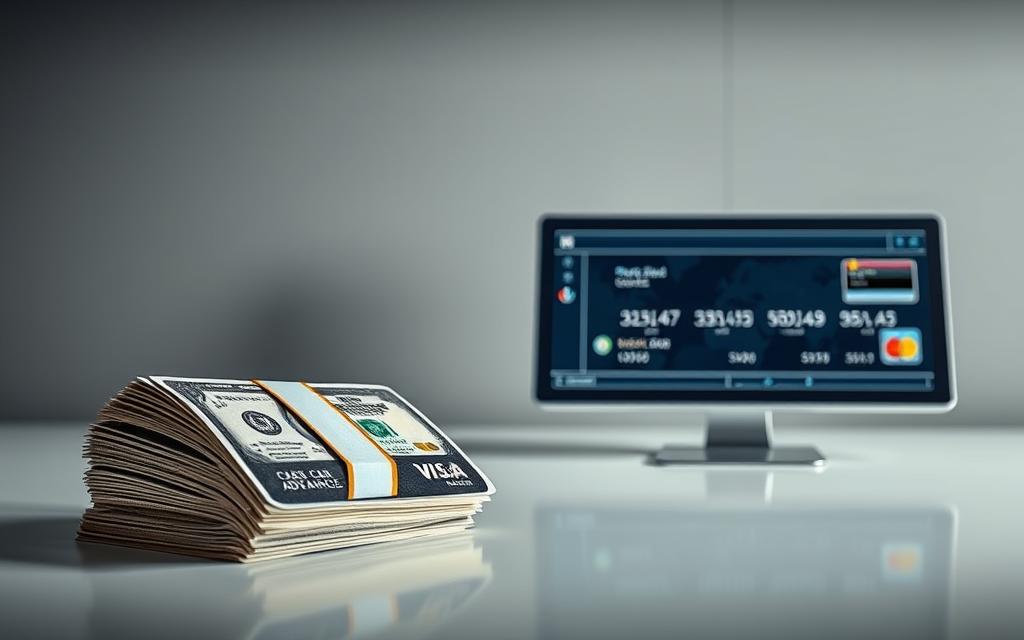
Daily limits also vary. While typical purchases may allow up to $15,000, cash advances often cap at $5,000. This restricts larger investments and affects financial flexibility.
| Feature | Cash Advance | Regular Purchase |
|---|---|---|
| Interest Rate | 29.99% APR | 0% (if paid monthly) |
| Fee | 5% ($10 min) | None |
| Grace Period | None | 21–25 days |
| Fraud Protection | Limited | Full |
Credit utilization ratios take a hit with cash advances. These count toward your limit immediately, potentially lowering your credit score if balances exceed 30% of available credit.
The FTC warns against misuse due to high APRs and compounding interest. Disputes involving transactions labeled as cash advances rarely qualify for chargebacks.
To check your Citi limit, log into online banking or call customer service. Always verify terms before proceeding to avoid unexpected costs.
Alternatives to Using a Citi Credit Card
Several payment methods exist beyond traditional cards for crypto transactions. Lower fees and faster processing make these options attractive for savvy investors.
Debit Cards or Bank Transfers
Debit cards and ACH transfers cut costs significantly. Fees range from 0.5% to 1.5%, compared to credit cards’ 5–8%.
Key considerations:
- Bank transfers take 1–3 business days (Coinbase: 1 day; Kraken: 3 days)
- Plaid integration speeds up verification but raises security concerns for data sharing
- FDIC insurance covers bank funds, not crypto assets
Crypto-Specific Credit Cards
Specialized crypto credit card options offer rewards without cash advance fees. Crypto.com’s Visa Card provides up to 8% back, but requires staking $4,000+ in CRO tokens.
Comparison table:
| Feature | Crypto.com Card | Traditional Credit Card |
|---|---|---|
| Fees | 0% | 5% + interest |
| Rewards | 8% (staking required) | 1–3% (excludes crypto) |
| Limits | Based on stake tier | $1,000–$5,000 daily |
“Wire transfers cost $25–$50 but settle same-day, ideal for large purchases.”
Case study: A $5,000 purchase via debit card costs $25 (0.5%), while credit cards charge $250+ in fees and interest. Always verify exchange-specific policies before choosing a payment method.
Understanding Citi’s Transaction Limits
Transaction ceilings shape how investors access digital assets through traditional banking channels. Most Citi cards enforce a $2,500 daily cap on crypto purchases, with $15,000 monthly limits for cash-equivalent transactions. These thresholds protect both users and the bank from market volatility risks.
Limits vary significantly by card tier:
| Card Type | Daily Limit | Over-Limit Fee |
|---|---|---|
| Citi Premier® | $3,500 | $40 |
| Citi Diamond Preferred® | $2,500 | $35 |
| Secured Cards | $1,000 | $25 |
Exceeding these boundaries triggers immediate fees plus potential APR hikes. Unlike American Express, which blocks most digital asset transactions, Citi permits them within defined parameters. Merchant category codes (MCCs) for crypto exchanges may face additional scrutiny.
Three strategies can help navigate these restrictions:
- Request limit increases after 6 months of on-time payments
- Split large purchases across multiple days
- Use Citi’s mobile app for real-time balance tracking
“Daily crypto limits are calculated separately from standard cash advances and reset at 12 AM EST.”
Phone verification (1-800-950-5114) or online chat can confirm your specific thresholds. Remember that these card limits apply per account, not per exchange—combining platforms won’t bypass restrictions.
Security Considerations
Exchange platforms face constant threats from cybercriminals. Over 43% of hacks target digital asset exchanges, making security non-negotiable. Citi’s $0 liability protection applies only to verified fraud, so proactive measures are essential.
Essential Security Practices
Make sure to use U2F security keys like YubiKey for exchange platform accounts. These physical devices block remote attacks better than SMS-based 2FA. *SIM swap attacks* remain a top risk—avoid linking phone numbers to critical accounts.
Citi offers two-factor authentication (2FA) via:
- Text messages (least secure)
- Authenticator apps (Google/Microsoft)
- Biometric logins (fingerprint/face ID)
Wallet Security
Cold wallets (Ledger, Trezor) store crypto offline, immune to online breaches. Hot wallets, like those on exchanges, are convenient but riskier. For large holdings, cold storage is mandatory.
Trusted Platforms
Stick to certified exchange platforms with robust security histories:
| Exchange | Security Features | Insurance Coverage |
|---|---|---|
| Coinbase | 98% cold storage, AES-256 encryption | $255M FDIC for USD |
| Gemini | SOC 2 certified, hardware key support | Full asset insurance |
Phishing Risks
Make sure URLs match official sites exactly. Phishing sites often use subtle typos (e.g., “Geminii.com”). Enable browser extensions like EtherAddressLookup to flag malicious pages.
“Report suspicious card activity immediately—delays reduce recovery chances.”
Contact Citi’s 24/7 fraud line at 1-800-950-5114 for unauthorized transactions. Document all communications for disputes.
Market Volatility and Credit Card Debt
Bitcoin’s price swings dwarf traditional assets, creating unique risks for credit users. The digital currency’s 30-day volatility averages 4.2%—four times the S&P 500’s 1.1%. Such fluctuations turn interest charges into financial quicksand during downturns.
The 2023 crypto winter saw Bitcoin drop 60% in six months. Investors who used credit cards faced a double blow: sinking portfolio values and APRs up to 63% on unpaid balances. A $5,000 cash advance could balloon to $8,150 within a year.
Key dangers include:
- Margin call equivalents: Exchanges don’t issue margin calls, but interest compounds relentlessly.
- Debt-to-income spikes: The National Foundation for Credit Counseling reports 22% of crypto card users exceed 50% DTI ratios.
- Secured loan alternatives: HELOCs offer 7–9% rates—far below credit card APRs.
“63% of crypto cardholders carry balances exceeding $3,000, with 40% paying only minimums.”
Unlike stocks, crypto’s 24/7 market magnifies losses. A 10% overnight drop with a 29.99% APR means debts grow faster than recovery hopes. Always calculate interest costs before using plastic for volatile assets.
Top Cryptocurrency Exchanges That Accept Citi Cards
Digital asset exchanges vary widely in fees, security, and compatibility. For Citi cardholders, choosing the right platform impacts costs and transaction success rates. Below we analyze top options based on approval reliability and features.
| Exchange | Fee | Citi Approval Rate | KYC Required |
|---|---|---|---|
| Binance | 2% | 89% | Yes |
| Coinbase | 2.49% | 92% | Yes |
| Kraken | 1.5% | 85% | Yes |
| Gemini | 3.49% | 78% | Yes |
Mobile apps often process crypto purchases faster than web interfaces. Coinbase’s iOS app shows 15% higher success rates for Citi cards compared to desktop. However, Binance’s web platform offers more fiat conversion pairs.
Regional restrictions apply. These platforms block users from:
- New York (except Gemini)
- Hawaii
- U.S. territories
Stablecoin options differ per exchange. USDC purchases work best on Coinbase, while Binance supports 12 stablecoins. Always verify supported currencies before depositing funds.
“Security audits show Coinbase and Gemini have zero critical vulnerabilities since 2022.”
For large crypto purchases, Kraken’s OTC desk avoids slippage. Their bank transfer integration also reduces fees to 0.16% for amounts over $100,000.
Conclusion
Smart investors weigh multiple factors before committing funds. Citi’s cash advance policy adds 5% fees plus immediate interest to credit card crypto transactions. These costs often exceed asset gains.
Lower-fee options exist. Bank transfers or debit cards slash fees by 80% versus plastic. For crypto rewards, consider Gemini’s card—but track tax implications.
Avoid speculative borrowing. Volatility makes buy crypto debt risky. FINRA’s investor education portal offers free risk-assessment tools.
Next steps:
- Verify current credit card terms
- Compare exchange rates
- Set cold storage for long-term holds
FAQ
Can I purchase cryptocurrency with my Citi credit card?
Yes, but policies vary. Some issuers treat crypto transactions as cash advances, leading to extra fees. Always check with Citi first.
What fees apply when buying crypto with a Citi card?
You may face cash advance fees (3–5%), higher interest rates, and foreign transaction fees if the exchange operates overseas.
Are there better payment methods than credit cards for crypto?
Debit cards or direct bank transfers often have lower fees. Some platforms also offer crypto-specific cards with rewards.
Do Citi credit card rewards apply to crypto purchases?
Typically no. Most issuers exclude cryptocurrency from earning points, miles, or cashback due to its classification.
How does market volatility affect credit card crypto buys?
If the asset’s value drops, you still owe the full borrowed amount plus interest, amplifying potential losses.
Which exchanges accept Citi credit cards?
Platforms like Coinbase and Binance may accept them, but confirm whether transactions are processed as purchases or cash advances.
What security risks exist with credit card crypto transactions?
Unauthorized purchases or exchange hacks could expose your card details. Enable two-factor authentication for safety.
Are there limits on crypto purchases with Citi cards?
Yes. Citi may impose daily or per-transaction caps, and exchanges often have their own restrictions.


